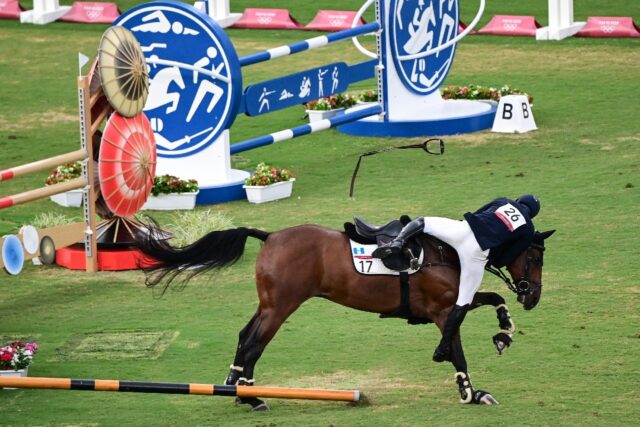Modern pentathlon’s image took a battering at the Tokyo Olympics, forcing one of the Games’ emblematic events to revamp itself as it battles to save its spot at Los Angeles 2028.
Riding was voted out by the national federations — 81 percent to 19 percent — last November after the shocking scenes in Tokyo where a German coach was seen to punch Saint Boy, one of the horses.
But it is unlikely cavalry officers caught behind enemy lines, who were the inspiration for the modern pentathlon that Baron de Coubertin introduced to the 1912 Olympics in Stockholm, would be able to get to grips with the mooted replacement for the riding section — the Ninja Warrior Obstacle Course.
Devised by a Japanese television station, it has become a ratings success globally — competitors have to swing like Tarzan as they confront obstacles such as Quintuple Steps, the Salmon Ladder and Spider Jump.
This, then, is the alternative to riding which will probably make its final bow at the 2024 Games in Paris, although the fencing, swimming, running and shooting elements remain.
After what have been termed four successful test events, the Ninja Warrior Obstacle Course will be voted on at a UIPM Congress on November 12/13.
Much hangs on the vote as modern pentathlon is currently on the programme for the 2028 Games — its fate will be decided by the IOC in 2023.
“You have to be realistic and you have to offer a future,” UIPM vice-president Joel Bouzou told AFP via Zoom on Monday.
Bouzou, world champion in 1987, said the obstacle course will be an adapted version of Ninja Warrior.
He acknowledges though there remain traditionalists who are still battling to have riding reinstated and have filed a motion to do so at the Congress.
“There are people against it like some former athletes and current athletes but they are a minority,” said Bouzou.
“Why? Because they love the sport as it is and I do too.
“But we must also talk with our head, talk to new generations and to grow and build up a complete athlete model and role model for society.”
‘Selfish choice’
Britain’s Olympic champion Joe Choong believes he would be good at the obstacle course but is vehemently against the idea.
“It’s been very sad for me to realise that as athletes actually we don’t matter,” he told AFP.
“We just helped the UIPM get paid, essentially by performing for them and it feels like we aren’t valued.
“Essentially if this change goes through, the entire current generation of athletes will just be pushed to one side and new obstacle-based athletes will come in.”
Bouzou argues that the event will be fairer for all the athletes than riding — drawing lots as to which horse you rode made it a lottery.
“Drawing a horse is sometimes ruining efforts for athletes who have prepared for four years,” he said.
“It ruined it for me and other athletes. This is part of the game but fairness should be part of the game. Now with this solution it is fair.”
Bouzou says that both in terms of cost and accessibility the obstacle course is a better option than riding — and should open up Modern Pentathlon to competitors from Africa or Asia.
France’s 2016 Olympic silver medallist Elodie Clouvel is all for the change and takes issue with those who oppose it.
“Saying that we have to keep horse riding, as I have heard from people resistant to change, is a very selfish choice,” she said.
However, young Czech pentathlete Filip Houska disagrees with those sentiments. He said the issue was not so much the horses but that the athletes need to up their game as riders.
“UIPM talks about Africa, but I am not sure every country can train for the other four disciplines properly anyway,” he told AFP.
Houska, 21, said he would love to continue for another 10 years but he is disillusioned.
“I feel like my future and sport is being stolen.”

COMMENTS
Please let us know if you're having issues with commenting.